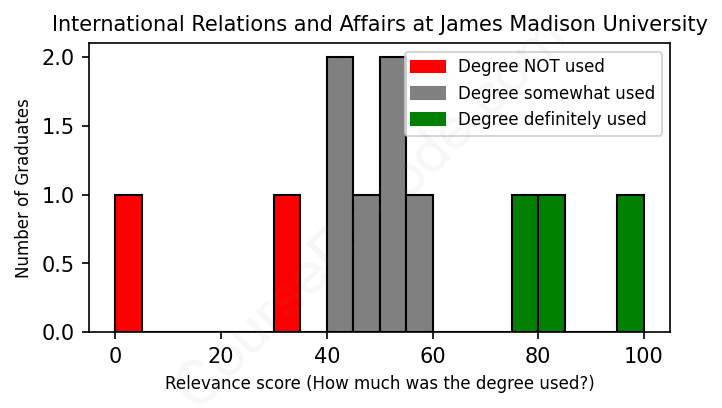
First, some facts. Of the International Relations and Affairs graduates from James Madison University we've analyzed , here's how many have used (or NOT used) their degree in their career:

These are estimates based on AI analysis of 11 LinkedIn profiles (see below).
The verdict? Significantly below average. Overall, with an average relevance score of 53%, International Relations and Affairs graduates from James Madison University have a much lower likelihood (-14%) of finding work in this field compared to the average graduate across all fields:
And for comparison, here's the chart for all profiles we've looked at across all degrees.
Also, after graduating, 45% of these graduates have pursued further education other than another Bachelor's degree (such as a Masters degree or other), compared to the average across all profiles of 35%. This suggests you may need more than just a Bachelors degree to be competitive as a International Relations and Affairs graduate.
See the details:
|
Relevance score: 44% We think this person has gone into a career only somewhat relevant to their degree. We think this person has gone into a career only somewhat relevant to their degree.
DEGREE INFOGraduated in 2015 from James Madison University with a Bachelor of Arts (B.A.) in International Relations and Affairs. Also pursued further education since (see below). JOB HISTORY SINCE GRADUATIONOI-GPS Associate Grant Thornton LLP Aug 2015 - Apr 2017 Supervisory Usher  National Park Service May 2017 - Aug 2017 Administrative Support Assistant  National Park Service Apr 2019 - Mar 2020 Administrative Program Specialist  National Park Service Mar 2020 - Apr 2022 Budget Analyst  National Park Service Feb 2022 - Present FURTHER DEGREES DONE SINCE GRADUATINGMaster of Public Administration - MPAUniversity of North Carolina at Chapel Hill 2017 - 2019 ABOUTNo information provided. |
The top 10 most common jobs done by the graduates we've analyzed (ranked most common to least) are:
When looking at the job paths of graduates from James Madison University with a degree in International Relations and Affairs, it’s clear that there are a variety of roles they’ve taken on, but many of these positions often stray quite far from the core focus of their studies. A good number of them have gone into the legal field—like working as law clerks, associates, or interns—which definitely aligns with the analytical and critical thinking skills developed in International Relations. These roles often touch on international law or involve interactions that require a solid understanding of global dynamics.
However, not all paths have maintained that connection to International Relations. Positions such as program directors in non-profits or roles in customer service and sales illustrate a shift towards management or administrative duties that don’t necessarily utilize the specialized knowledge from their degree. Many graduates found themselves in jobs where the relevance of their education was minimal—like bartending or as pro-shop attendants—indicating a potential struggle in directly linking their academic background to their career aspirations. While some graduates have successfully integrated their International Relations expertise into their work, a significant portion have embarked on paths that suggest a broader, sometimes tangential relationship with the field. Overall, the spectrum of jobs reflects a mix of relevant and less relevant experiences, showcasing the diverse opportunities available to graduates, albeit not always aligned with their intended academic focus.
Here is a visual representation of the most common words in job titles for International Relations and Affairs graduates (this is across all International Relations and Affairs graduates we've analyzed, not just those who went to James Madison University):

So, looking at the career trajectories of graduates from James Madison University with a degree in International Relations and Affairs, it seems like there’s a mixed bag when it comes to what they end up doing after college. For many, the first jobs after graduation tend to be internships or entry-level positions in law, non-profits, or even government positions. Some students go down the legal route, taking on roles like Law Clerk or Litigation Associate fairly early in their careers, which is pretty promising if you're looking to be involved in the legal aspects of international relations. Others have taken on roles that drift a bit away from pure International Relations work, like golf instruction or administrative positions, which isn’t what most people would expect from a degree in that field.
If we look at where some of these graduates are five or ten years down the road, there’s a mix again. Some are thriving in positions at significant organizations like the World Bank, while others have moved into more niche fields or unrelated areas, like golf management or healthcare recruitment. It’s clear that while some have managed to carve out solid paths that leverage their degree, others have diverged from that trajectory. Overall, it seems like a good number of JMU graduates do find relevant careers in the realm of International Relations and Affairs, but many also take fairly different paths that might not directly utilize what they studied in college.
Getting a Bachelor’s degree in International Relations and Affairs at James Madison University, or really anywhere, can be a mixed bag. On one hand, you’ll dive into some super interesting topics—everything from political theories to global economics, and those subjects can be pretty engaging if you’re into world events. On the other hand, there’s a fair amount of reading and critical analysis involved, so if you’re not a fan of heavy reading or writing, it might feel a bit challenging. Overall, I'd say it’s around average in terms of difficulty. It’s not the easiest major out there, but it’s definitely manageable if you keep on top of your studies and have a passion for the subject!
Most commonly, in the LinkedIn profiles we've looked at, it takes people 4 years to finish a Bachelor degree in International Relations and Affairs.
Looking at these James Madison University grads, it seems like they've managed to carve out some pretty decent careers, especially for their stages in life. The law school alum from 2012 has made his way up in the legal world, which typically pays well—though he started as an intern, he's now an associate. The 2014 grad is climbing the ranks at the World Bank, a place known for its generous pay scales. Meanwhile, the grads in more specialized roles, like golf instruction and the military, also seem to have solid earnings, especially with leadership positions and government roles that often come with good benefits. Overall, while not everyone's path leads to a high roller lifestyle right away, they all appear to be doing pretty well for themselves.
Here is a visual representation of the most common words seen in the "about" section of LinkedIn profiles who have a Bachelor degree in International Relations and Affairs (this is across all International Relations and Affairs graduates we've analyzed, not just those who went to James Madison University). This may or may not be useful:

Here are all colleges offering a Bachelor degree in International Relations and Affairs (ordered by the average relevance score of their International Relations and Affairs graduates, best to worst) where we have analyzed at least 10 of their graduates:
| College | Score | Count |
|---|---|---|
 The George Washington University The George Washington University
|
70 | 36 |
 American University American University
|
64 | 21 |
 Boston University Boston University
|
63 | 12 |
 The University of Georgia The University of Georgia
|
56 | 21 |
 University of Southern California University of Southern California
|
56 | 13 |
 James Madison University James Madison University
|
53 | 11 |
 University of California, Davis University of California, Davis
|
50 | 11 |
 University of Colorado Boulder University of Colorado Boulder
|
49 | 16 |
 Florida International University Florida International University
|
47 | 36 |
 Florida State University Florida State University
|
45 | 29 |